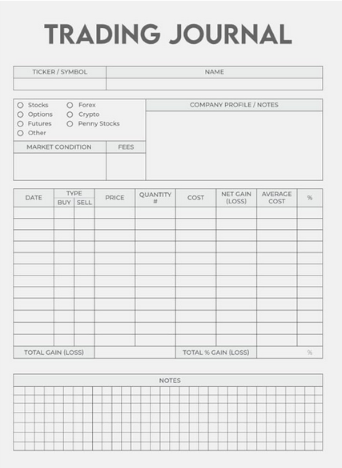There are so many fundamental Forex trading tips that you will be aware of and try and take on board when you begin Forex trading. If you start out doing the basics correctly you will have an improved chance of success.
In this short article, we have included seven short Forex trading tips for newcomers that cover off the basics and will provide you with value for your future trading endeavors. Remember, many new traders go on to make a good income from their FX trading activities and so why should you not be one of them!

1. Your trading style should reflect your personality
Your chosen Forex trading style should align with your personality, as trading involves making decisions under pressure and requires significant risk management to limit potential losses. By aligning your personality with your trading style will lead to improved performance, consistency and discipline
Factors to consider when you are trying to match a trading style with your personality include:
Lifestyle compatibility
Lifestyle is a factor that will impact on the style you trade. A short term trading style, like scalping or day trading is unsuitable if you are trading around a full time job. Instead, swing trading or position trading will be more appropriate.

Emotional control
Forex trading can be an emotional roller coaster and by trading according to your personality is more likely to see you keep control under pressure. For example, following a long-term trading strategy will better suit calm and patient traders rather than an impulsive trader, who is looking for greater trading activity.
Natural decision making
Some Forex traders are very analytical and are driven by data; whereas other traders rely more on intuition. Your style of trading should allow decision making in the way that feels the most natural to you.
2. Never over trade
You should only trade in amounts and frequency that you are comfortable with until you are completely confident with your ability to trade Forex. If you over trade it may have a negative impact in the following ways:
Mental exhaustion
By over-trading you can become susceptible to mental exhaustion, especially in short term trading strategies. It can result in decision fatigue where the quality of trading decisions will gradually decrease with the more decisions you have to make. Over the course of a trading day or trading week, the negative impact of over-trading could really start to impact on you.
The lack of a strategy
When you over-trade it is an indication that you lack a solid trading strategy or the discipline to adhere to one. The absence of a coherent strategy turns your trading efforts into gambling rather than calculated risk taking.
Revenge Trading
After suffering a significant trading loss, ill-disciplined traders may try and get their ‘revenge’ on the market by placing trades with minimal rationale behind them. Such a reaction can result in a vicious cycle of further losses and over-trading

3. Let a winning trade run
To trade Forex more profitably, once you have a winning trade, there are increased benefits from letting the trade and profits run:
Overcome the fear of missing out
The fear of missing out, also known as FOMO, can see traders jump into trades without proper analysis. Through letting winning trades run, traders can offset the negative mindset of missing out on other trading opportunities.
Efficiency of time and resources
The time and effort to manage a large winning position is no different to that of managing a small position. If you let winning trades run, it is a more productive use of both your time and resources.
Improving your risk reward ratio
Having a favorable risk reward ratio is fundamental to successful Forex trading. When you let a winning trade run, the potential reward increases while the initial risk remains the same; assuming you are moving your stop-loss up to break even.

4. Cut your losses quickly and accept them
By cutting losses quickly by letting a losing trade stop out and accepting it is fundamental to being a successful Forex trader. There are a number of reasons the practice is crucial:
Capital account preservation
In our article why FX trading requires strict money management, we identified how small losses of 2% of capital can be recovered quicker than larger losses. Remember that a 25% loss on your trading account requires a corresponding 50% gain to break even!
Avoid the “sunk cost fallacy”
The sunk cost fallacy in trading is the belief of continuing with a loss-making trade due to the time and money already invested, despite the risk of potential losses outweighing the benefits. By cutting losses quickly on a badly performing trade, Forex traders can avoid any fallacy and trade in the present and not the past.
Opportunity cost
By holding on to losing trades may tie up capital from your trading account that could be deployed to better trading opportunities. By cutting losses, traders ensure that their capital is free for fresh trades.

5. The trend is your friend
The old saying is “the trend is your friend,” anchors one of the central principles of technical analysis. The saying implies that Forex traders may improve their chances of success by trading in alignment with the current trend. When trading currencies, there are a few reasons why this principle has relevance:
Momentum
A trend is an indication that momentum lies behind a currency’s price movement. By placing trades that move with the trend, traders are seeking to capitalize on the momentum, which increases the chance of the trade making money.
Filtering out noise
The FX market is susceptible to random price movements or “noise” which can lead to false trading signals. By trading with the trend can help filter out noise and allow focus on more substantial price movements.
A higher probability of success
Forex trades placed in the trend direction usually have a higher probability to succeed as they go with the momentum of the market rather then against the flow.
Here is a very informative video giving further Forex trading tips for beginners
6. Always keep to the rules
An inexperienced trader will feel tested to the limit in times of high volatility. When the spot moves rapidly, losses can occur if a trader does not stick rigidly to the rules set out in their own trading system which includes:
Consistency
Adhering to a ruled based trading system creates consistency in your trading approach. By following a robust set of guidelines allows for accurate assessment of a strategy’s effectiveness and to make adjustments as necessary.
The 2% rule
It is best practice in Forex trading to place no more than 2% of your trading capital on a single trade. As the forex market is so volatile, keeping to the rule can help traders navigate through periods of high volatility by avoiding panic decisions through predetermined actions. Losing 2% of your capital is easier to recover than an ill-disciplined trade that loses 25% of your trading account.
Performance evaluation
If you are trading within a wider trading system it makes it easier to evaluate your trading performance. If trading results are lackluster, you can look back at your trading rules to pinpoint what is likely working and what isn’t.

7. Keep a trading journal
A trading journal is essential and the best traders are those that keep detailed records of trades so that they can review them at any time for different reasons:
Goal-setting and tracking
Trading journals are a good way to set trading goals and track any progress towards them. The process helps maintain motivation and keeps your trading aligned with original strategy objectives.

Accountability
A journal will hold you accountable to your underlying trading system and strategies. It makes you question the reasoning behind every trade, helping to prevent irrational trading.
Learning and improvement
Trading journals are learning tools. Through writing your thoughts behind every trade, and comparing the expected outcome with the final result provides insights into trading processes and decision making. With the information at hand for analysis, it will help lead to continuous trading improvements.
For further Forex tips please read this additional guide that we have written that will hopefully help you to trade profitably.
Written by Chris Gillie

Chris Gillie is the founder of Axcess FX, a Forex software review and research website. He is a former investment banker who worked in FX Sales on the UBS London trading floor. Chris has been using Forex trading software as part of his trading set-up since the late 2000s and the embryonic days of MetaTrader and the MQL coding language.
Additional Resources
